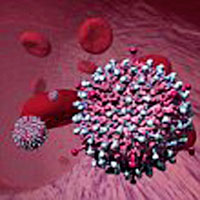|

by Mike Barrett
November 5, 2012
from
NaturalSociety Website

We’ve seen genetically modified
mosquitoes, genetically modified plants, and genetically modified
cows, but could we soon be dealing with our own genetic
alterations... genetically modified humans?
As the months and years pass, scientists
seem to be getting closer to ‘manufacturing’ humankind, with some of
the most recent ‘advancements’ revolving around a new approved drug
therapy that is designed to ‘correct genetic errors’.
Glybera, the drug which was approved in
Europe on November 1, was created to combat against a rare disorder
leading to disrupted fat production. Those suffering this rare
disease possess what scientists describe as a damaged gene; the drug
is meant to repair the damaged gene.
While the drug is only meant to be
given to 1 or 2 out of every million people, it paves way for
further experimentation into the field of biotechnology and human
alteration.
Soon, doctors may be giving out
drugs to treat any ‘defects’ in genes, whether it be for the
so-called ‘fat’ gene or another instance where a damaged gene is
present. It could
even apply to
purported ‘criminal’ genes that are
said to predict an individual’s future ‘life of crime’.
It
may sound crazy, but scientists are already making even more serious
moves that will alter or ‘create’ humankind.
Further Genetically
Modifying Humanity
Although gene-altering drugs are
indeed helping to pave the way for further human genetic
modification, it is only a single move in the game.
Just a few months ago, we reported
on the very first group of genetically
modified babies being ‘created’ in the United States. The
scientists stated that 30 babies were born using genetic
modification techniques. In addition, 2 of the babies tested were
found to contain genes from a total of 3 different parents.
Genetecists state that this
genetic modification method may
one day be used to
create genetically modified babies,
“with extra, desired characteristics such as
strength or high intelligence.”
Interestingly enough, that day may
come sooner than expected - at least for some of us.
Even
leading scientists are now pushing
for selective breeding based on genetic makeup, ‘handpicking’ genes
of offspring, and even developing cloning technology to ‘grow’ human
hybrids and other bizarre experiments.
While gene-altering drugs and GM babies
may appeal to the general public, scientists and biotech companies
heavily funded by the government have been working on achieving a
much larger feat -genetically modified humans in the form of ‘super
soldiers’.
These GM humans go beyond even the
imagination, not requiring food or sleep to perform Olympic-style
physical feats, while being able to regrow limbs that were
destroyed by enemy fire.
Drug to Fix Faulty DNA
...Gets
Go-Ahead in Landmark Move that May Alter Medicine Forever
by Jenny Hope
2 November 2012
from
DailyMail Website
Gene therapy drug given green light for
rare disease
Glybera to cost £1m ($1.6m) for each patient
Drug is first to get approval in Western world
EU go-ahead paves way for many more treatments

Regulators yesterday approved the first
therapy in the western world that can correct errors in a person’s
genetic code.
Europe has approved
Glybera to be used against a rare
inherited disorder which disrupts fat production in the body. The
treatment uses a virus to counteract
LPLD, lipoprotein lipase
deficiency, which can led to acute inflammation of the pancreas.
The illness affects around one or two people per million and
sufferers have damaged copies of a gene which is essential for
breaking down fats. The virus infects muscle cells with a copy of a
healthy gene and a one-off treatment is effective.
The treatment was backed by an advisory panel to the European
Commission in July and full approval was granted yesterday. The
medicine should be available next year.
Professor John Kastelein, of the University of Amsterdam,
said the therapy would have a ‘dramatic impact’ on patients. Only
two other gene therapies have previously been approved for sale,
both in China.
It will cost around £1 million ($1.6 million) per patient, a new
record for pricey modern medicines.
Joern Aldag, chief executive of Amsterdam-based
uniQure, said more such treatments
would follow and argued a high price was justified because gene
therapy restored natural body function and was not just a short-term
fix.
'This provides higher benefit to
patients than the classical protein replacement strategy and
this is why we think we should be fairly and adequately
compensated,' he said in a telephone interview on Friday
Patients with LPLD, which affects no
more than one or two people per million, are unable to handle fat
particles in their blood and are at risk of acute and potentially
fatal inflammation of the pancreas.
The approval follows a positive recommendation from the European
Medicines Agency (EMA)
in July.
WHAT DOES GLYBERA DO?
The therapy uses a virus (pictured below) to infect muscle
cells with a working copy of the gene.
Glybera treats the genetic disorder lipoprotein lipase
deficiency (LPLD) by altering sufferers' DNA. LPLD affects
about one in a million people, leaving them without a vital
gene that breaks down fat particles in their blood.
It means fat builds up in the blood leading to abdominal
pain and life-threatening inflammation of the pancreas
(pancreatitis). The only other way to manage the disease is
by having a very low-fat diet.

The privately owned firm is now working
with governments on potential pricing strategies, which are likely
to vary from country to country, ahead of the commercial roll-out
from the second half of 2013.
Aldag said some countries preferred the idea of a one-off payment at
the time of treatment but others were interested in an annuity
system, which would probably involve charging around £200,000 a year
for five years.
That kind of annual charge would put Glybera in a similar price
range to expensive enzyme replacement therapies for other rare
diseases, such as Cerezyme for Gaucher disease from Sanofi's Genzyme
unit.
UniQure is also preparing to apply for regulatory approval for
Glybera in the United States, Canada and other markets.
The idea of treating disease by replacing a defective gene with a
working copy gained credence in 1990 with the success of the world's
first gene therapy clinical tests against a rare condition called
severe combined immunodeficiency (SCID).
People with SCID - also known as 'bubble boy disease' - cannot cope
with infections and usually die in childhood.
The field then suffered a major setback when an Arizona teenager
died in a gene therapy experiment in 1999 and two French boys with
SCID developed leukaemia in 2002.
In China, Shenzhen
SiBiono GeneTech won approval
for a gene therapy drug for head and neck cancer in 2003 but no
products have been approved until now in Europe or the United
States.
More recently, some large pharmaceutical companies have also been
exploring gene therapy. GlaxoSmithKline, for example, signed a deal
in 2010 with Italian researchers to develop a SCID therapy.
|



